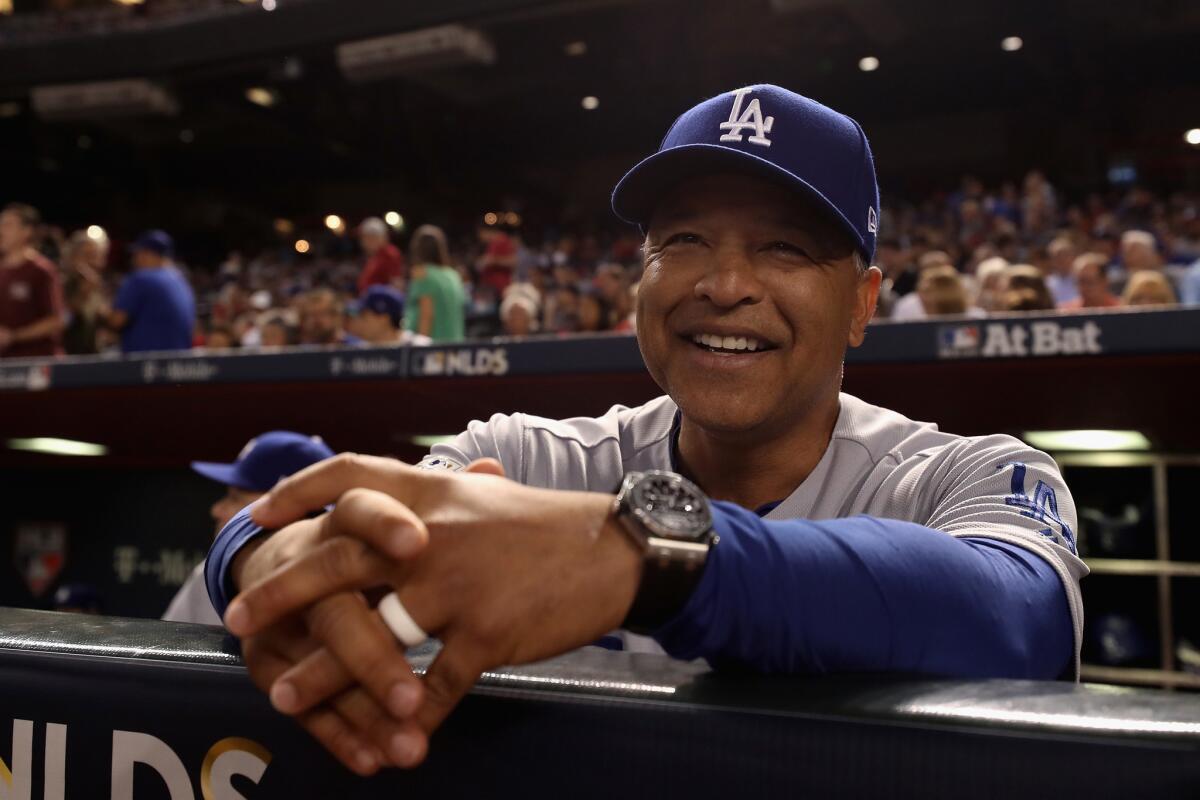Dave Roberts is putting all the heartache of 2017 behind him

Dave Roberts plans to host a visitor at his home next week. He befriended Houston Astros manager A.J. Hinch during half a decade together in the Padres organization, and their bond remained sturdy after seven games as World Series opponents. When Hinch mentioned he was attending a wedding near San Diego, Roberts invited him to stay over. He did not even balk when he learned who the man of honor was.
“He’s going to be in town for Springer’s wedding,” the Dodgers manager mentioned at lunch one afternoon this week.
Wait. George Springer? The World Series MVP? The Astro who starred in the sequence that still haunts Dodgers fans? Roberts chuckled at the cosmic coincidence. He did not intend to send Springer a gift.
“He should be sending me a present,” Roberts cracked as he picked over a plate of sashimi in strip-mall sushi joint just off the freeway in Encinitas. “A.J. better bring a really good bottle of wine.”
The wounds look like scars now. Two months have passed since the final out of Game 7, long enough for Roberts to feel satisfaction in guiding the Dodgers to their first National League pennant since 1988, rather than bitterness over a championship drought entering its 30th year.
Fans have stopped asking why Clayton Kershaw didn’t start in Yu Darvish’s place in the final game. Roberts has ceased replaying that second inning — when Springer homered after Roberts stuck with Darvish one batter too long — and started crafting his message to his players for his third spring training as a manager.
Roberts faced a sizable amount of scrutiny in his first two seasons. He was the NL manager of the year in 2016 as his team overcame a historic number of injuries to win the division. The Dodgers torched the competition in the summer of 2017, surviving a hellish September to finish with 104 victories, the most since the franchise left Brooklyn. Roberts operated his bullpen like a maestro during the first two rounds of the postseason and his reputation for tactical prowess appeared secure.
During seven days and nights against the Astros, Roberts weathered almost as much as his pitching staff. Each loss invited criticism on radio airwaves and in the social-media lagoon: He pulled Rich Hill too soon in Game 2. He wasted his best relievers in Game 3. He stuck with Brandon Morrow too long in Game 5. He did not go to Morrow soon enough in Game 7, before Springer’s second at-bat.
Roberts said he has never watched a replay of Game 7. The night is “still vivid in my head,” he said. Without prompting, he reiterated his reasoning for starting Darvish. Houston had hammered Darvish in Game 3, but the organization still viewed him as the best option. Alex Wood had never started on short rest before. And Kershaw had only rested for two days after Game 5, when he could not protect seven runs of support.
Kershaw would end up throwing four innings in Game 7, but he exceeded internal expectations to do so. As the Dodgers scripted out the evening, they hoped Darvish and Wood could cover the bulk of the game, with both Kershaw and closer Kenley Jansen capable of throwing two innings each at the end.
“Could we have started Clayton? Yeah,” Roberts said. “But I think it was unfair to put him in that spot.”
So Wood and Kershaw watched from the bullpen as Darvish combusted. He gave up two runs before securing two outs. An inning later, he issued a walk and a double before a pair of groundouts produced a run. “That second inning happened pretty quickly,” Roberts said.
As Springer approached the plate with two outs, Morrow was available in the bullpen. But with the pitcher’s spot due up third in the bottom of the inning, Roberts did not want to use Morrow for only one batter. The decision backfired when Springer blasted a two-run homer into the outfield pavilion. The Dodgers never recovered in a 5-1 loss.
“I’m being totally honest, I can’t even remember if amongst ourselves we were saying ‘Go to the ‘pen,’ ” general manager Farhan Zaidi said. “I can’t even remember.”
He added, “It’s not a game that you’re going to relive and talk about the strategy, the Xs and O’s. Because from a baseball standpoint, there wasn’t a lot in that game.”
The front office did not stage an in-depth post-mortem. The executives became consumed by offseason busywork. The players scattered across the country. The end came so quickly, the organization left behind a clutch of champagne bottles intended for the championship celebration. Zaidi walks past the stockpile each day on his way to the weight room.
“It hurts,” Zaidi said. “Just like I know it hurts for the fans.”
Roberts returned to San Diego. He did not do much traveling outside of a trip to Mexico for Justin Turner’s wedding and a trip to Santa Barbara for Joc Pederson’s wedding. He concentrated on his family, and regular visits with his mother, Eiko, who is battling Parkinson’s disease.
Roberts managed through heartache in 2017. A few weeks before the start of the season, he lost his father, Waymon. The schedule did not permit time to grieve, or aid his mother’s transition and ongoing therapy. After he buried his father, Roberts rejoined the Dodgers and tried to bury himself in work. He called his dad’s voicemail one day in April, just so he could hear his voice. On the eve of the playoffs, he broke down looking over old family photos.
After the World Series, Roberts dedicated himself to reconnecting with his mother. He sounded encouraged by her progress. He visited his father’s grave several times. “Shed a lot of tears,” Roberts said. “Did a lot of soul-searching. It was good.”
Along the way, Roberts maintained contact with his front office as they tinkered with the roster. The lack of necessary reconstruction offered a reminder for how much talent the Dodgers still possess.
In the aftermath of defeat, Roberts recalled a conversation with Peter Guber, a member of the Dodgers’ ownership group who also owns a stake in the Golden State Warriors. Guber relayed how Warriors coach Steve Kerr rebounded after the 2015-16 season, when his team set an NBA record for regular-season victories but blew a 3-1 lead to Cleveland in the Finals. Kerr opted to push forward, rather than look back in anger, and the Warriors responded with a championship in 2017.
The concept resonated with Roberts. To use the ending of 2017 as motivation for the beginning of 2018 felt unproductive, he decided. Scars do not disappear, but they do fade.
“It has to be a different season,” Roberts said. “Sometimes with teams, when you lose last in the postseason, there’s a carryover. It’s got to be in your mind, and I get that. But it’s got to be a different year.”
Twitter: @McCulloughTimes
More to Read
Are you a true-blue fan?
Get our Dodgers Dugout newsletter for insights, news and much more.
You may occasionally receive promotional content from the Los Angeles Times.








